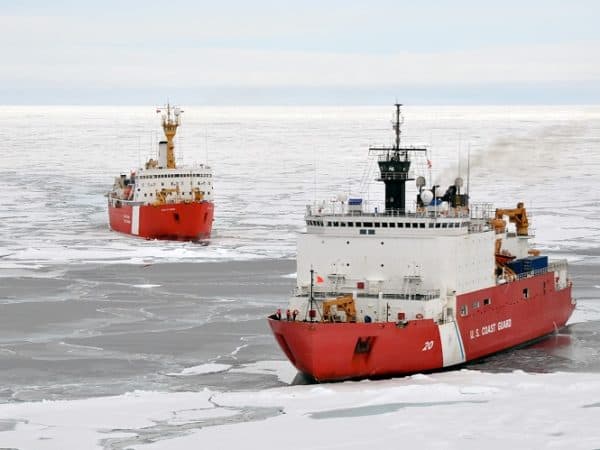
 Indigenous groups want a seat at the table for Arctic shipping talks.
Indigenous groups want a seat at the table for Arctic shipping talks.
An international group that sets the rules for the worldwide shipping trade is preparing to meet to discuss maritime traffic through the Arctic, and this time, a delegation of Arctic aboriginals will be on hand to have their voices heard.
“I would like to see we don’t have (shipping) 12 months of the year even if we have [the Arctice] ice free,” says Canadian Inuit leader Tagak Curley, one of five aboriginal presenters to this year’s meeting of the International Maritime Organization (IMO), a United Nations group comprised of 171 countries. “Wildlife is easily impacted. Their breeding season is in the early spring and summer,” says Curley.
With global warming limiting the amount of ice buildup in Arctic waters, more and more shipping companies are eyeing the North as a potential trade route. But environmental advocates along with Indigenous groups are warning that safeguards must be put in place, both to limit traffic and combat potential oil spills so as to protect local habitats and Indigenous ways of life.
The IMO is set to institute in January 2017 a new Polar Code to regulate Arctic shipping and travel, with Indigenous groups hoping that their involvement in the regulatory framework will continue going forward.
“They need to consult with Inuit groups and Arctic people,” says Curley. “There’s not enough consultation with the IMO. [Shipping traffic] is only going to increase, the frequency of commercial and tourist shipping. It’s time we do it correctly.”
Of particular concern is the shipping industry’s use of heavy fuel oil, a substance known to be harmful to both humans and wildlife, especially damaging to Arctic environments. Already banned from use in Antarctic shipping and traffic, heavy fuel oil emulsifies on the ocean surface when spilled and can be difficult to clean up, especially in remote locales.
Earlier this year, an international coalition of NGOs spoke to the IMO about the risks, with World Wildlife Fund Canada’s senior specialist in sustainable shipping, Andrew Dumbrille, stating, “[Heavy fuel oil] is produces the most soot, the most black carbon, the most particulate matter, the most nitric oxide, the most sulfur oxide of any fuel. When this black soot is on the surface of snow, it decreases the ability of that snow to reflect heat and when more heat is absorbed, more melting occurs, more climate change occurs.”

Indigenous concerns are said to be high on the list of priorities for the current Liberal government in Canada, with Prime Minister Justin Trudeau calling for “a renewed, nation-to-nation relationship with First Nations peoples.”
Trudeau’s ambitions have so far gained the support of Indigenous advocates (and given the nod by the Tragically Hip’s Gord Downie, no less), but controversy erupted earlier this year when Justice Minister Jody Wilson-Raybould announced that the government would not be adopting the United Nations Declaration on the Rights of Indigenous People (UNDRIP) into Canadian law, saying that such a move would be overly simplistic and would stand in conflict with current treaty legislation.
“Simplistic approaches such as adopting the United Nations declaration as being Canadian law are unworkable and, respectfully, a political distraction to undertaking the hard work actually required to implement it back home in communities,” said Minister Wilson-Raybould.
Earlier this year, the federal government received praise from both Indigenous and environmental groups for its joint declaration with the United States on the Arctic, conceived in consultation with Arctic Indigenous groups.
The declaration calls for controls on Arctic fishing, the creation of low impact shipping corridors and incorporating Indigenous knowledge into future decision-making processes.
The IMO’s Marine Environment Protection Committee will meet this week to discuss mandatory regulations requiring ships to record and report their fuel consumption and to cap sulphur content in fuel oil.
Leave a Reply
You must be logged in to post a comment.




 Share
Share Tweet
Tweet Share
Share




Comment